
Darius the Great is Not Okay is a young adult novel by Adib Khorram that focuses on Iranian American teen Darius Kellner’s transformative journey to Iran with his family. Darius feels like a social outcast as he battles his crippling depression, lack of Persian culture in his identity, and bullying from classmates like Trent “Fatty” Bolger and Chip Cusumano at school. However, upon setting foot in Iran to visit his ailing grandfather for the first time, Darius meets Sohrab, a neighbor of his grandparents’, who changes his life by becoming the best friend Darius felt he never had. Through their close-knit relationship, Darius and Sohrab venture through the complexities of growing up, fitting in, and mental health.
I personally enjoyed the book for its heartfulness’ among the characters as well as Darius’s commentary on aspects of Persian culture the reader may not be familiar with. I love that the book debunked common misconceptions that surround Persian culture and explored the religious diversity and cultural monuments within Iran. Sohrab and Darius’s relationship was very warm and sweet, but I think that the time it took to develop their relationship was unrealistic. Darius felt like he had a best friend from his first day in Iran and Sohrab is depicted as an almost perfect friend which I believe is not practical for realistic fiction. I also disliked how there was not a strong conflict that pulled me to continue to read the story. I liked that the book extensively covered Darius’s half-Persian identity, but I wish the author would have explored Babou and Darius’s relationship further. Throughout the story, the author touches on Babou and Darius’s relationship from time to time, but I believe their relationship could have delved into furthermore. However, the author makes up for this by developing complex character growth between Darius and his father in terms of how they cope with their mental health. I also liked that mental health issues were presented in a different perspective where the author did not depict mental health issues as something the characters inherently had. Despite lacking a strong conflict, depth to Babou and Darius’s relationship, and a realistic friendship between Sohrab and Darius, the book contains wonderful observations about Persian culture, heartwarming relationships between the characters, and important provoking thoughts on mental health. I would recommend this book to anyone who is interested in light YA reads, bildungsroman’s, books about Persian culture, or stories that focus on mental health. I would not recommend this book to anyone who is interested in longer YA reads or books that have a clear conflict.
